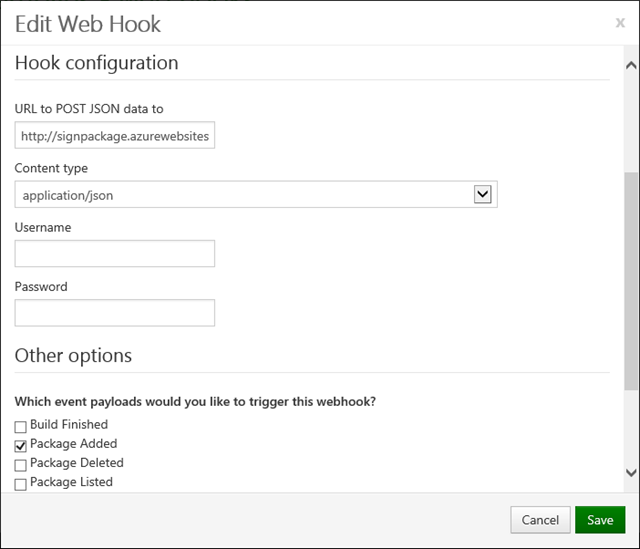Implementing custom package retention using webhooks
Earlier this week, we got the question if custom retention policies could be enforced on MyGet. More specific, the request was to be able to keep the latest 5 versions of a minor version (e.g. keep 1.0.6 through 1.0.2, but delete 1.0.1 and 1.0.0). We’ve introduced webhooks on MyGet to enable exactly this sort of scenarios!
Our own retention policies run whenever a package is added to a feed, so let’s see if we can implement a webhook handler that does exactly what was asked… The code for this blog post can be found in our GitHub organization.
Building the webhook handler
We’ll first need something that can run our custom logic whenever a webhook event is raised. This can be an ASP.NET MVC, Web API, NancyFx or even a PHP application. In this case, let’s go with an ASP.NET Web API controller. We want to be triggered on POST when a package added event is raised.
// POST /api/retention public async Task<HttpResponseMessage> Post([FromBody]WebHookEvent payload) { // The logic in this method will do the following: // 1) Find all packages with the same identifier as the package that was added to the originating feed // 2) Enforce the following policy: only the 5 latest (stable) packages matching the same minor version may remain on the feed. Others should be removed. string feedUrl = payload.Payload.FeedUrl; // Note: the following modifies NuGet's client so that we authenticate every request using the API key. // If credentials (e.g. username/password) are preferred, set the NuGet.HttpClient.DefaultCredentialProvider instead. PackageRepositoryFactory.Default.HttpClientFactory = uri => { var client = new NuGet.HttpClient(uri); client.SendingRequest += (sender, args) => { args.Request.Headers.Add("X-NuGet-ApiKey", ConfigurationManager.AppSettings["Retention:NuGetFeedApiKey"]); }; return client; }; // Prepare HttpClient (non-NuGet) var httpClient = new HttpClient(); httpClient.DefaultRequestHeaders.Add("X-NuGet-ApiKey", ConfigurationManager.AppSettings["Retention:NuGetFeedApiKey"]); // Fetch packages and group them (note: only doing this for stable packages, ignoring prerelease) var packageRepository = PackageRepositoryFactory.Default.CreateRepository(feedUrl); var packages = packageRepository.GetPackages().Where(p => p.Id == payload.Payload.PackageIdentifier).ToList(); foreach (var packageGroup in packages.Where(p => p.IsReleaseVersion()) .GroupBy(p => p.Version.Version.Major + "." + p.Version.Version.Minor)) { foreach (var package in packageGroup.OrderByDescending(p => p.Version).Skip(5)) { await httpClient.DeleteAsync(string.Format("{0}api/v2/package/{1}/{2}?hardDelete=true", feedUrl, package.Id, package.Version)); } } return new HttpResponseMessage(HttpStatusCode.OK) { ReasonPhrase = "Custom retention policy applied." }; }
Once we have this in place and are hosting it somewhere, we can configure the webhook on our MyGet feed.
Configuring the webhook
On our MyGet feed, we can create a new webhook. It should send application/json for the package added event to the URL where we deployed the above code.
When this hook now triggers, we will be retaining just the 5 latest minor versions of a package (ignoring prereleases).
That’s it. Using nothing but webhooks, we can run our own retention policies (or other logic) when something happens on our feed (like strong-name signing packages, for example). There are a number of events that we can subscribe to!
Happy packaging!
